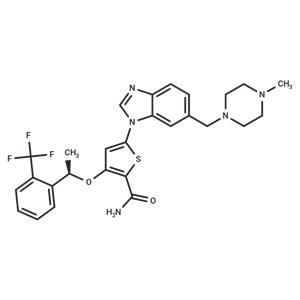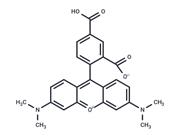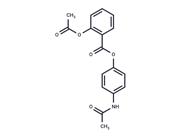| Name | GSK461364 |
| Description | GSK461364 (GSK461364A)(Ki=2.2 nM) inhibits purified Plk1 .The specificity of GSK461364 for Plk1 is more than 1000-fold over Plk2/3. |
| Cell Research | Cancer cell lines are seeded into 384-well microtiter plates. After seeding, the cells are incubated at 37 °C in 5% CO2 for 24 hours. GSK461364 is added to each cell line at 10 nM with a nontreated control. A zero-time (T = 0) value is read for each cell line. After 72 hours, the medium containing GSK461364 or DMSO control is aspirated from all of the remaining cells and the cell nuclei are stained with 4′,6-diamidino-2-phenylindole and the fluorescent intensity measured using an InCell1000 High Content Analyzer. The percent intensity of the 4′,6-diamidino-2-phenylindole stain at 72 hours, relative to intensity at time zero, is calculated for each concentration of GSK461364 in each of the triplicate wells. (Only for Reference) |
| Kinase Assay | Enzyme assays: Kinase reactions are performed in a final assay volume of 10 μL using the Z-Lyte Assay kit (Ser/Thr peptide 16). Briefly, reactions contains 50 mM HEPES (pH 7.5), 10 mM MgCl2, 1 mM EGTA, 1 mM DTT, 0.01% Brij 35, 0.01 mg/mL casein, 200 μM ATP, 200 μM Polo Box peptide (NH2-MAGPMQS[pT]PLNGAKK-OH), and 6 nM recombinant Plk1 (H6-tev-PLK 1-603). Plk1 is preincubated for 60 minutes with 0 to 1 μM GSK461364. Reactions are then initiated by the addition of 2 μM peptide. After 15 minutes at 23 °C, reactions are quenched and processed according the Z′-Lyte protocol and read on an EnVision plate reader. Raw fluorescence values are converted to concentration of product formed using substrate and product standards. Because the potency of inhibition for GSK461364 is observed to vary as a function of the ATP concentration in a manner consistent with an ATP-competitive mode of inhibition, an upper limit for the Ki for GSK461364 is determined. |
| In vitro | GSK461364 inhibits cancer cell line proliferation from multiple origins with minimal toxicity in nondividing human cells. [1] RNA silencing of WT p53 increases the antiproliferative activity of GSK461364. As many cancer therapies tend to be more effective in p53 WT patients, the higher sensitivity of p53-deficient tumors toward GSK461364 could potentially offer an opportunity to treat tumors that are refractory to other chemotherapies as well as early line therapy for these genotypes. GSK461364 is a thiophene amide that inhibits purified Plk1 enzyme in vitro with a Ki of 2 nM and has >100-fold selectivity for Plk1 compared with Plk2 and Plk3. GSK461364 is a potent inhibitor of cell proliferation causing 50% growth inhibition (GI50) below 100 nM in most of the cell lines tested with limited toxicity against human nonproliferating cells. Inhibition of cell cycle progression is concentration dependent with initial delay at G2 phase at high GSK461364 concentrations and arrest at M phase at lower concentrations. Currently, GSK461364 is in a dose-escalation first-time-in-human trial. Cell lines with mutations in the TP53 gene tended to be more sensitive to GSK461364, and that inhibiting the p53 response by RNA silencing confers increased sensitivity in some p53 wild-type (WT) cells. Furthermore, these more sensitive cell lines also have increased levels of chromosome instability, a characteristic associated with TP53 mutations. [2] In preclinical testing, GSK461364 shows antiproliferative activity against multiple (>120) tumor cell lines and potently inhibits the proliferation of greater than 83% and 91% of these cell lines, with IC50 values lower than 50 and 100 nM, respectively. [3] |
| In vivo | Cell culture growth inhibition by GSK461364 can be cytostatic or cytotoxic but leads to tumor regression in xenograft tumor models under proper dose scheduling. GSK461364 shows clear antitumor activity in human tumor xenograft models. [1] GSK461364 shows a dose-dependent mitotic arrest in mouse xenografts, which correlates with effects on tumor growth. [2] Intraperitoneal administration of GSK461364 causes regression or tumor growth delay in different xenograft models, including Colo205 xenografts. Suppression of Plk1 in vivo by using GSK461364 results in mitotic arrest with aberrant mitotic figures consisting of monopolar or collapsed mitotic spindles. [3] |
| Storage | Powder: -20°C for 3 years | In solvent: -80°C for 1 year | Shipping with blue ice. |
| Solubility Information | Ethanol : 28 mg/mL (51.5 mM)
DMSO : 1 mg/ml, Sonication is recommended.
H2O : < 1 mg/mL (insoluble or slightly soluble)
|
| Keywords | inhibit | Inhibitor | Polo-like Kinase (PLK) | GSK-461364 | GSK461364 | GSK 461364 |
| Inhibitors Related | Onvansertib | Plogosertib | T521 | (E/Z)-Rigosertib sodium | SBE13 Hydrochloride | Pyridoxine | Rigosertib sodium | 3MB-PP1 | Ro3280 | Volasertib | Poloxin-2 | BI 2536 |
| Related Compound Libraries | Highly Selective Inhibitor Library | Bioactive Compound Library | Kinase Inhibitor Library | Anti-Cancer Clinical Compound Library | Drug Repurposing Compound Library | Inhibitor Library | Clinical Compound Library | Bioactive Compounds Library Max | Anti-Cancer Drug Library | Anti-Cancer Active Compound Library |

 United States
United States



